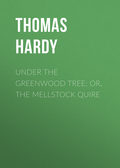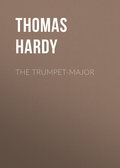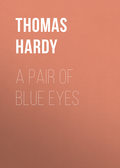полная версия

Томас Харди (Гарди)
Late Lyrics and Earlier, With Many Other Verses
“I WORKED NO WILE TO MEET YOU”
(SONG)
I worked no wile to meet you,
My sight was set elsewhere,
I sheered about to shun you,
And lent your life no care.
I was unprimed to greet you
At such a date and place,
Constraint alone had won you
Vision of my strange face!
You did not seek to see me
Then or at all, you said,
– Meant passing when you neared me,
But stumblingblocks forbade.
You even had thought to flee me,
By other mindings moved;
No influent star endeared me,
Unknown, unrecked, unproved!
What, then, was there to tell us
The flux of flustering hours
Of their own tide would bring us
By no device of ours
To where the daysprings well us
Heart-hydromels that cheer,
Till Time enearth and swing us
Round with the turning sphere.
AT THE RAILWAY STATION, UPWAY
“There is not much that I can do,
For I’ve no money that’s quite my own!”
Spoke up the pitying child —
A little boy with a violin
At the station before the train came in, —
“But I can play my fiddle to you,
And a nice one ’tis, and good in tone!”
The man in the handcuffs smiled;
The constable looked, and he smiled, too,
As the fiddle began to twang;
And the man in the handcuffs suddenly sang
Uproariously:
“This life so free
Is the thing for me!”
And the constable smiled, and said no word,
As if unconscious of what he heard;
And so they went on till the train came in —
The convict, and boy with the violin.
SIDE BY SIDE
So there sat they,
The estranged two,
Thrust in one pew
By chance that day;
Placed so, breath-nigh,
Each comer unwitting
Who was to be sitting
In touch close by.
Thus side by side
Blindly alighted,
They seemed united
As groom and bride,
Who’d not communed
For many years —
Lives from twain spheres
With hearts distuned.
Her fringes brushed
His garment’s hem
As the harmonies rushed
Through each of them:
Her lips could be heard
In the creed and psalms,
And their fingers neared
At the giving of alms.
And women and men,
The matins ended,
By looks commended
Them, joined again.
Quickly said she,
“Don’t undeceive them —
Better thus leave them:”
“Quite so,” said he.
Slight words! – the last
Between them said,
Those two, once wed,
Who had not stood fast.
Diverse their ways
From the western door,
To meet no more
In their span of days.
DREAM OF THE CITY SHOPWOMAN
’Twere sweet to have a comrade here,
Who’d vow to love this garreteer,
By city people’s snap and sneer
Tried oft and hard!
We’d rove a truant cock and hen
To some snug solitary glen,
And never be seen to haunt again
This teeming yard.
Within a cot of thatch and clay
We’d list the flitting pipers play,
Our lives a twine of good and gay
Enwreathed discreetly;
Our blithest deeds so neighbouring wise
That doves should coo in soft surprise,
“These must belong to Paradise
Who live so sweetly.”
Our clock should be the closing flowers,
Our sprinkle-bath the passing showers,
Our church the alleyed willow bowers,
The truth our theme;
And infant shapes might soon abound:
Their shining heads would dot us round
Like mushroom balls on grassy ground.
– But all is dream!
O God, that creatures framed to feel
A yearning nature’s strong appeal
Should writhe on this eternal wheel
In rayless grime;
And vainly note, with wan regret,
Each star of early promise set;
Till Death relieves, and they forget
Their one Life’s time!
Westbourne Park Villas, 1866.
A MAIDEN’S PLEDGE
(SONG)
I do not wish to win your vow
To take me soon or late as bride,
And lift me from the nook where now
I tarry your farings to my side.
I am blissful ever to abide
In this green labyrinth – let all be,
If but, whatever may betide,
You do not leave off loving me!
Your comet-comings I will wait
With patience time shall not wear through;
The yellowing years will not abate
My largened love and truth to you,
Nor drive me to complaint undue
Of absence, much as I may pine,
If never another ’twixt us two
Shall come, and you stand wholly mine.
THE CHILD AND THE SAGE
You say, O Sage, when weather-checked,
“I have been favoured so
With cloudless skies, I must expect
This dash of rain or snow.”
“Since health has been my lot,” you say,
“So many months of late,
I must not chafe that one short day
Of sickness mars my state.”
You say, “Such bliss has been my share
From Love’s unbroken smile,
It is but reason I should bear
A cross therein awhile.”
And thus you do not count upon
Continuance of joy;
But, when at ease, expect anon
A burden of annoy.
But, Sage – this Earth – why not a place
Where no reprisals reign,
Where never a spell of pleasantness
Makes reasonable a pain?
December 21, 1908.
MISMET
I
He was leaning by a face,
He was looking into eyes,
And he knew a trysting-place,
And he heard seductive sighs;
But the face,
And the eyes,
And the place,
And the sighs,
Were not, alas, the right ones – the ones meet for him —
Though fine and sweet the features, and the feelings all abrim.
II
She was looking at a form,
She was listening for a tread,
She could feel a waft of charm
When a certain name was said;
But the form,
And the tread,
And the charm
Of name said,
Were the wrong ones for her, and ever would be so,
While the heritor of the right it would have saved her soul to know!
AN AUTUMN RAIN-SCENE
There trudges one to a merry-making
With a sturdy swing,
On whom the rain comes down.
To fetch the saving medicament
Is another bent,
On whom the rain comes down.
One slowly drives his herd to the stall
Ere ill befall,
On whom the rain comes down.
This bears his missives of life and death
With quickening breath,
On whom the rain comes down.
One watches for signals of wreck or war
From the hill afar,
On whom the rain comes down.
No care if he gain a shelter or none,
Unhired moves one,
On whom the rain comes down.
And another knows nought of its chilling fall
Upon him at all,
On whom the rain comes down.
October 1904.
MEDITATIONS ON A HOLIDAY
(A NEW THEME TO AN OLD FOLK-JINGLE)
’Tis May morning,
All-adorning,
No cloud warning
Of rain to-day.
Where shall I go to,
Go to, go to? —
Can I say No to
Lyonnesse-way?
Well – what reason
Now at this season
Is there for treason
To other shrines?
Tristram is not there,
Isolt forgot there,
New eras blot there
Sought-for signs!
Stratford-on-Avon —
Poesy-paven —
I’ll find a haven
There, somehow! —
Nay – I’m but caught of
Dreams long thought of,
The Swan knows nought of
His Avon now!
What shall it be, then,
I go to see, then,
Under the plea, then,
Of votary?
I’ll go to Lakeland,
Lakeland, Lakeland,
Certainly Lakeland
Let it be.
But – why to that place,
That place, that place,
Such a hard come-at place
Need I fare?
When its bard cheers no more,
Loves no more, fears no more,
Sees no more, hears no more
Anything there!
Ah, there is Scotland,
Burns’s Scotland,
And Waverley’s. To what land
Better can I hie? —
Yet – if no whit now
Feel those of it now —
Care not a bit now
For it – why I?
I’ll seek a town street,
Aye, a brick-brown street,
Quite a tumbledown street,
Drawing no eyes.
For a Mary dwelt there,
And a Percy felt there
Heart of him melt there,
A Claire likewise.
Why incline to that city,
Such a city, that city,
Now a mud-bespat city! —
Care the lovers who
Now live and walk there,
Sit there and talk there,
Buy there, or hawk there,
Or wed, or woo?
Laughters in a volley
Greet so fond a folly
As nursing melancholy
In this and that spot,
Which, with most endeavour,
Those can visit never,
But for ever and ever
Will now know not!
If, on lawns Elysian,
With a broadened vision
And a faint derision
Conscious be they,
How they might reprove me
That these fancies move me,
Think they ill behoove me,
Smile, and say:
“What! – our hoar old houses,
Where the past dead-drowses,
Nor a child nor spouse is
Of our name at all?
Such abodes to care for,
Inquire about and bear for,
And suffer wear and tear for —
How weak of you and small!”
May 1921.
AN EXPERIENCE
Wit, weight, or wealth there was not
In anything that was said,
In anything that was done;
All was of scope to cause not
A triumph, dazzle, or dread
To even the subtlest one,
My friend,
To even the subtlest one.
But there was a new afflation —
An aura zephyring round,
That care infected not:
It came as a salutation,
And, in my sweet astound,
I scarcely witted what
Might pend,
I scarcely witted what.
The hills in samewise to me
Spoke, as they grayly gazed,
– First hills to speak so yet!
The thin-edged breezes blew me
What I, though cobwebbed, crazed,
Was never to forget,
My friend,
Was never to forget!
THE BEAUTY
O do not praise my beauty more,
In such word-wild degree,
And say I am one all eyes adore;
For these things harass me!
But do for ever softly say:
“From now unto the end
Come weal, come wanzing, come what may,
Dear, I will be your friend.”
I hate my beauty in the glass:
My beauty is not I:
I wear it: none cares whether, alas,
Its wearer live or die!
The inner I O care for, then,
Yea, me and what I am,
And shall be at the gray hour when
My cheek begins to clam.
Note. – “The Regent Street beauty, Miss Verrey, the Swiss confectioner’s daughter, whose personal attractions have been so mischievously exaggerated, died of fever on Monday evening, brought on by the annoyance she had been for some time subject to.” – London paper, October 1828.
THE COLLECTOR CLEANS HIS PICTURE
Fili hominis, ecce ego tollo a te desiderabile oculorum tuorom in plaga. – Ezech. xxiv. 16
How I remember cleaning that strange picture!
I had been deep in duty for my sick neighbour —
His besides my own – over several Sundays,
Often, too, in the week; so with parish pressures,
Baptisms, burials, doctorings, conjugal counsel —
All the whatnots asked of a rural parson —
Faith, I was well-nigh broken, should have been fully
Saving for one small secret relaxation,
One that in mounting manhood had grown my hobby.
This was to delve at whiles for easel-lumber,
Stowed in the backmost slums of a soon-reached city,
Merely on chance to uncloak some worthy canvas,
Panel, or plaque, blacked blind by uncouth adventure,
Yet under all concealing a precious art-feat.
Such I had found not yet. My latest capture
Came from the rooms of a trader in ancient house-gear
Who had no scent of beauty or soul for brushcraft.
Only a tittle cost it – murked with grime-films,
Gatherings of slow years, thick-varnished over,
Never a feature manifest of man’s painting.
So, one Saturday, time ticking hard on midnight
Ere an hour subserved, I set me upon it.
Long with coiled-up sleeves I cleaned and yet cleaned,
Till a first fresh spot, a high light, looked forth,
Then another, like fair flesh, and another;
Then a curve, a nostril, and next a finger,
Tapering, shapely, significantly pointing slantwise.
“Flemish?” I said. “Nay, Spanish.. But, nay, Italian!”
– Then meseemed it the guise of the ranker Venus,
Named of some Astarte, of some Cotytto.
Down I knelt before it and kissed the panel,
Drunk with the lure of love’s inhibited dreamings.
Till the dawn I rubbed, when there gazed up at me
A hag, that had slowly emerged from under my hands there,
Pointing the slanted finger towards a bosom
Eaten away of a rot from the lusts of a lifetime.
– I could have ended myself in heart-shook horror.
Stunned I sat till roused by a clear-voiced bell-chime,
Fresh and sweet as the dew-fleece under my luthern.
It was the matin service calling to me
From the adjacent steeple.
THE WOOD FIRE
(A FRAGMENT)
“This is a brightsome blaze you’ve lit good friend, to-night!”
“ – Aye, it has been the bleakest spring I have felt for years,
And nought compares with cloven logs to keep alight:
I buy them bargain-cheap of the executioners,
As I dwell near; and they wanted the crosses out of sight
By Passover, not to affront the eyes of visitors.
“Yes, they’re from the crucifixions last week-ending
At Kranion. We can sometimes use the poles again,
But they get split by the nails, and ’tis quicker work than mending
To knock together new; though the uprights now and then
Serve twice when they’re let stand. But if a feast’s impending,
As lately, you’ve to tidy up for the corners’ ken.
“Though only three were impaled, you may know it didn’t pass off
So quietly as was wont? That Galilee carpenter’s son
Who boasted he was king, incensed the rabble to scoff:
I heard the noise from my garden. This piece is the one he was on.
Yes, it blazes up well if lit with a few dry chips and shroff;
And it’s worthless for much else, what with cuts and stains thereon.”
SAYING GOOD-BYE
(SONG)
We are always saying
“Good-bye, good-bye!”
In work, in playing,
In gloom, in gaying:
At many a stage
Of pilgrimage
From youth to age
We say, “Good-bye,
Good-bye!”
We are undiscerning
Which go to sigh,
Which will be yearning
For soon returning;
And which no more
Will dark our door,
Or tread our shore,
But go to die,
To die.
Some come from roaming
With joy again;
Some, who come homing
By stealth at gloaming,
Had better have stopped
Till death, and dropped
By strange hands propped,
Than come so fain,
So fain.
So, with this saying,
“Good-bye, good-bye,”
We speed their waying
Without betraying
Our grief, our fear
No more to hear
From them, close, clear,
Again: “Good-bye,
Good-bye!”
ON THE TUNE CALLED THE OLD-HUNDRED-AND-FOURTH
We never sang together
Ravenscroft’s terse old tune
On Sundays or on weekdays,
In sharp or summer weather,
At night-time or at noon.
Why did we never sing it,
Why never so incline
On Sundays or on weekdays,
Even when soft wafts would wing it
From your far floor to mine?
Shall we that tune, then, never
Stand voicing side by side
On Sundays or on weekdays?.
Or shall we, when for ever
In Sheol we abide,
Sing it in desolation,
As we might long have done
On Sundays or on weekdays
With love and exultation
Before our sands had run?
THE OPPORTUNITY
(FOR H. P.)
Forty springs back, I recall,
We met at this phase of the Maytime:
We might have clung close through all,
But we parted when died that daytime.
We parted with smallest regret;
Perhaps should have cared but slightly,
Just then, if we never had met:
Strange, strange that we lived so lightly!
Had we mused a little space
At that critical date in the Maytime,
One life had been ours, one place,
Perhaps, till our long cold daytime.
– This is a bitter thing
For thee, O man: what ails it?
The tide of chance may bring
Its offer; but nought avails it!
EVELYN G. OF CHRISTMINSTER
I can see the towers
In mind quite clear
Not many hours’
Faring from here;
But how up and go,
And briskly bear
Thither, and know
That are not there?
Though the birds sing small,
And apple and pear
On your trees by the wall
Are ripe and rare,
Though none excel them,
I have no care
To taste them or smell them
And you not there.
Though the College stones
Are smit with the sun,
And the graduates and Dons
Who held you as one
Of brightest brow
Still think as they did,
Why haunt with them now
Your candle is hid?
Towards the river
A pealing swells:
They cost me a quiver —
Those prayerful bells!
How go to God,
Who can reprove
With so heavy a rod
As your swift remove!
The chorded keys
Wait all in a row,
And the bellows wheeze
As long ago.
And the psalter lingers,
And organist’s chair;
But where are your fingers
That once wagged there?
Shall I then seek
That desert place
This or next week,
And those tracks trace
That fill me with cark
And cloy; nowhere
Being movement or mark
Of you now there!
THE RIFT
(Song: Minor Mode)
’Twas just at gnat and cobweb-time,
When yellow begins to show in the leaf,
That your old gamut changed its chime
From those true tones – of span so brief! —
That met my beats of joy, of grief,
As rhyme meets rhyme.
So sank I from my high sublime!
We faced but chancewise after that,
And never I knew or guessed my crime..
Yes; ’twas the date – or nigh thereat —
Of the yellowing leaf; at moth and gnat
And cobweb-time.
VOICES FROM THINGS GROWING IN A CHURCHYARD
These flowers are I, poor Fanny Hurd,
Sir or Madam,
A little girl here sepultured.
Once I flit-fluttered like a bird
Above the grass, as now I wave
In daisy shapes above my grave,
All day cheerily,
All night eerily!
– I am one Bachelor Bowring, “Gent,”
Sir or Madam;
In shingled oak my bones were pent;
Hence more than a hundred years I spent
In my feat of change from a coffin-thrall
To a dancer in green as leaves on a wall.
All day cheerily,
All night eerily!
– I, these berries of juice and gloss,
Sir or Madam,
Am clean forgotten as Thomas Voss;
Thin-urned, I have burrowed away from the moss
That covers my sod, and have entered this yew,
And turned to clusters ruddy of view,
All day cheerily,
All night eerily!
– The Lady Gertrude, proud, high-bred,
Sir or Madam,
Am I – this laurel that shades your head;
Into its veins I have stilly sped,
And made them of me; and my leaves now shine,
As did my satins superfine,
All day cheerily,
All night eerily!
– I, who as innocent withwind climb,
Sir or Madam.
Am one Eve Greensleeves, in olden time
Kissed by men from many a clime,
Beneath sun, stars, in blaze, in breeze,
As now by glowworms and by bees,
All day cheerily,
All night eerily! 2
– I’m old Squire Audeley Grey, who grew,
Sir or Madam,
Aweary of life, and in scorn withdrew;
Till anon I clambered up anew
As ivy-green, when my ache was stayed,
And in that attire I have longtime gayed
All day cheerily,
All night eerily!
– And so they breathe, these masks, to each
Sir or Madam
Who lingers there, and their lively speech
Affords an interpreter much to teach,
As their murmurous accents seem to come
Thence hitheraround in a radiant hum,
All day cheerily,
All night eerily!
ON THE WAY
The trees fret fitfully and twist,
Shutters rattle and carpets heave,
Slime is the dust of yestereve,
And in the streaming mist
Fishes might seem to fin a passage if they list.
But to his feet,
Drawing nigh and nigher
A hidden seat,
The fog is sweet
And the wind a lyre.
A vacant sameness grays the sky,
A moisture gathers on each knop
Of the bramble, rounding to a drop,
That greets the goer-by
With the cold listless lustre of a dead man’s eye.
But to her sight,
Drawing nigh and nigher
Its deep delight,
The fog is bright
And the wind a lyre.
“SHE DID NOT TURN”
She did not turn,
But passed foot-faint with averted head
In her gown of green, by the bobbing fern,
Though I leaned over the gate that led
From where we waited with table spread;
But she did not turn:
Why was she near there if love had fled?
She did not turn,
Though the gate was whence I had often sped
In the mists of morning to meet her, and learn
Her heart, when its moving moods I read
As a book – she mine, as she sometimes said;
But she did not turn,
And passed foot-faint with averted head.
GROWTH IN MAY
I enter a daisy-and-buttercup land,
And thence thread a jungle of grass:
Hurdles and stiles scarce visible stand
Above the lush stems as I pass.
Hedges peer over, and try to be seen,
And seem to reveal a dim sense
That amid such ambitious and elbow-high green
They make a mean show as a fence.
Elsewhere the mead is possessed of the neats,
That range not greatly above
The rich rank thicket which brushes their teats,
And her gown, as she waits for her Love.
Near Chard.
THE CHILDREN AND SIR NAMELESS
Sir Nameless, once of Athelhall, declared:
“These wretched children romping in my park
Trample the herbage till the soil is bared,
And yap and yell from early morn till dark!
Go keep them harnessed to their set routines:
Thank God I’ve none to hasten my decay;
For green remembrance there are better means
Than offspring, who but wish their sires away.”
Sir Nameless of that mansion said anon:
“To be perpetuate for my mightiness
Sculpture must image me when I am gone.”
– He forthwith summoned carvers there express
To shape a figure stretching seven-odd feet
(For he was tall) in alabaster stone,
With shield, and crest, and casque, and word complete:
When done a statelier work was never known.
Three hundred years hied; Church-restorers came,
And, no one of his lineage being traced,
They thought an effigy so large in frame
Best fitted for the floor. There it was placed,
Under the seats for schoolchildren. And they
Kicked out his name, and hobnailed off his nose;
And, as they yawn through sermon-time, they say,
“Who was this old stone man beneath our toes?”
2. It was said her real name was Eve Trevillian or Trevelyan; and that she was the handsome mother of two or three illegitimate children, circa 1784–95.






